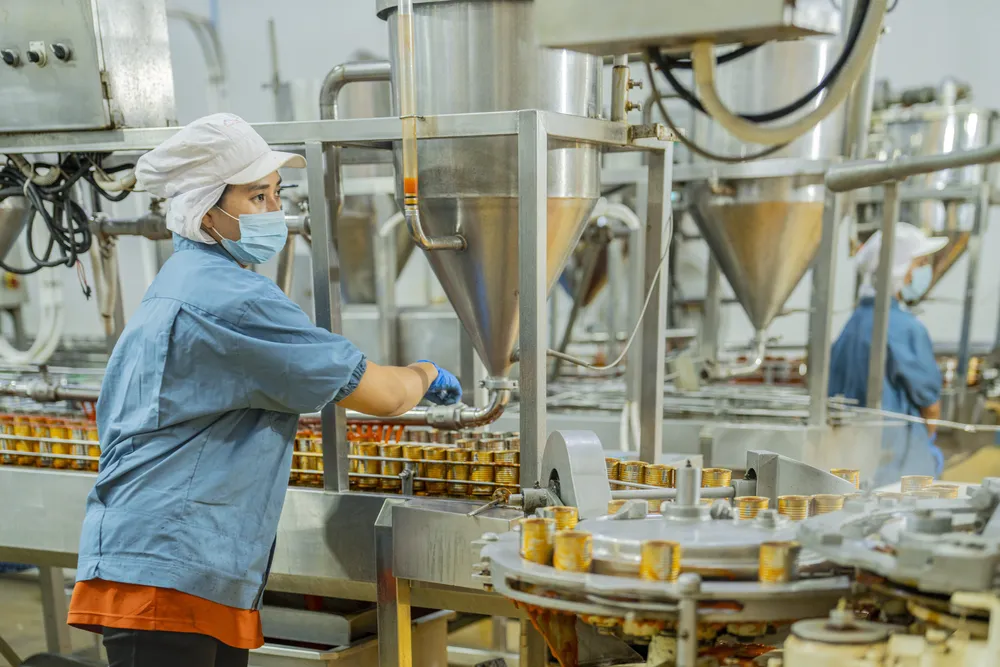Core Function – Foundation of Food Machinery
Key Components Supporting Food Production
Bearings play an indispensable role in food processing machinery, serving as core elements that ensure smooth and efficient operation of mixing equipment, conveyor systems, packaging lines, and processing machinery. In food production environments, equipment must continuously withstand high humidity, temperature fluctuations, and frequent cleaning procedures, posing special requirements for bearing performance. Appropriate bearing selection directly impacts production efficiency, hygiene compliance, and equipment service life, making material selection, sealing technology, and lubrication methods critical factors in ensuring optimal performance while meeting strict food safety standards.
Material Standards – Specialty Alloy Selection
Special Requirements for Food-Grade Bearings
Material selection represents the primary consideration in food-grade bearing design. While standard chrome steel bearings suffice for general industrial environments, they cannot meet the requirements of corrosive media commonly found in food processing. Martensitic stainless steels (such as AISI 440C) offer excellent corrosion resistance and high fatigue strength, making them ideal for contact with moisture and chemical cleaning agents. For enhanced performance, nitrogen-strengthened martensitic stainless steels provide approximately five times higher corrosion resistance than traditional materials, with their fine microstructure contributing to extended service life and reduced operational noise. Other bearing components including shields, snap rings, and cages typically utilize austenitic stainless steels (AISI 302 or 304), known for their exceptional corrosion resistance and chemical inertness.
Innovative Solutions – Hybrid Bearing Applications
Addressing Extreme Humid Environments
In application scenarios involving direct fluid contact or potent cleaning chemicals, hybrid bearing configurations demonstrate exceptional performance. These specialized units combine martensitic stainless steel rings with silicon nitride ceramic rolling elements. The ceramic balls provide inherent corrosion immunity while significantly reducing friction and wear. Complemented by cages manufactured from advanced polymers like PTFE, chemical resistance and low-friction characteristics are further enhanced. This integrated design solution ensures continuous reliable operation while substantially reducing maintenance requirements, particularly suitable for dairy, beverage, and seafood processing where hygiene standards are extremely stringent.
Integrated Bearing Units – Structural Design Optimization
Housing Configuration and Installation Solutions
Mounted bearing units are widely used in food processing conveyors and packaging machinery. These integrated systems consist of radial ball bearings housed within protective enclosures, with pillow block arrangements common for light-load applications and flange or vertical housings preferred for heavy-duty operations. Material selection for bearing inserts and housings prioritizes corrosion resistance, typically employing AISI 440C stainless steel or plated alternatives for cost-sensitive installations. Modern housing designs increasingly adopt thermoplastic composites, providing lightweight construction alongside inherent corrosion resistance. The key to all housing designs lies in smooth surfaces, rounded corners, and seamless connections that prevent bacterial growth and ensure thorough cleaning.
Lubrication Technology – Maintenance and Safety Balance
Lubrication Strategies Ensuring Food Compliance
Lubrication strategies for food-grade bearings must balance mechanical performance with strict hygiene requirements. Traditional lubricants tend to degrade under frequent high-pressure washing or extreme temperatures, potentially creating contamination risks. Modern solutions employ NSF H1-registered synthetic greases that maintain stability under demanding conditions while ensuring safety during incidental food contact. The food industry increasingly adopts sealed-for-life and self-lubricating bearing designs to eliminate maintenance interventions, reduce downtime, and prevent lubrication-related contamination. For critical applications including dough processing and filling lines, systematic lubrication management ensures continuous compliance with food safety regulations.
Hygiene and Performance – System Integration Solutions
Synergistic Effects Achieving Operational Excellence
The successful integration of bearing systems in food processing equipment depends on perfect coordination between technical performance and hygiene requirements. Advanced designs eliminate crevices and surface irregularities that could harbor microorganisms, while food-compatible materials and lubricants prevent chemical contamination. Beyond hygiene considerations, precision-engineered bearings significantly enhance energy efficiency through reduced friction, decreased operational noise, and extended equipment service life. These comprehensive advantages strongly support sustainable manufacturing practices while maintaining the highest product safety and quality standards.
Quality Assurance – Standards and Certification
Compliance System Building Trust
Trust in industrial components is built on transparent quality control and compliance with international standards. Food-grade bearing suppliers consistently meet ISO certifications, industry-specific approvals, and customer audit criteria. These measures ensure every component satisfies stringent requirements for dimensional accuracy, material quality, and load performance. Standardization also simplifies global procurement processes and enhances interoperability across markets and applications.
Engineering Innovation – Sustainable Development
Perfect Combination of Environmental Protection and Performance
The modern food industry increasingly emphasizes reducing environmental impact while maintaining performance. Food-grade bearings support these goals through designs that minimize energy consumption, reduce wear, and extend lubricant service intervals. Top manufacturers adopt sustainable production methods, including the use of recycled materials, energy-efficient processes, and designs permitting end-of-life recycling. These initiatives support broader environmental, social, and governance objectives while maintaining high standards of performance and reliability.
Future Prospects – Technological Advancement
Innovation Momentum Driving Food Industry Development
Continuous advancement in bearing technology remains crucial for the development of the food processing industry. Innovations in material science, sealing solutions, and lubrication technologies constantly push performance boundaries. Smart bearings integrated with sensors enable predictive maintenance, further improving equipment reliability and production efficiency. As the industry moves toward higher automation levels and digital transformation, these advanced bearing solutions will play an increasingly important role in supporting smart manufacturing practices and sustainable food production.
Conclusion – Embodiment of Engineering Excellence
Enhancing Food Production Through Advanced Bearing Technology
Bearings in the food processing industry have transcended their traditional role as simple mechanical components, becoming critical elements ensuring production reliability, safety, and efficiency. From material handling to processing and packaging, bearing performance directly affects system functionality and hygiene compliance. Through appropriate material selection, advanced sealing technologies, and correct lubrication strategies, equipment designers and plant operators can significantly improve operational efficiency, reduce maintenance costs, and ensure strict adherence to food safety standards. Continuous innovation in bearing technology remains essential for enhancing food processing capabilities, supporting the industry’s evolving demands for higher productivity, improved sustainability, and uncompromising product quality.
